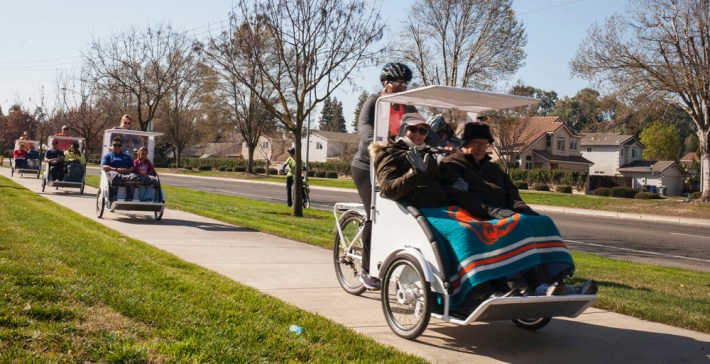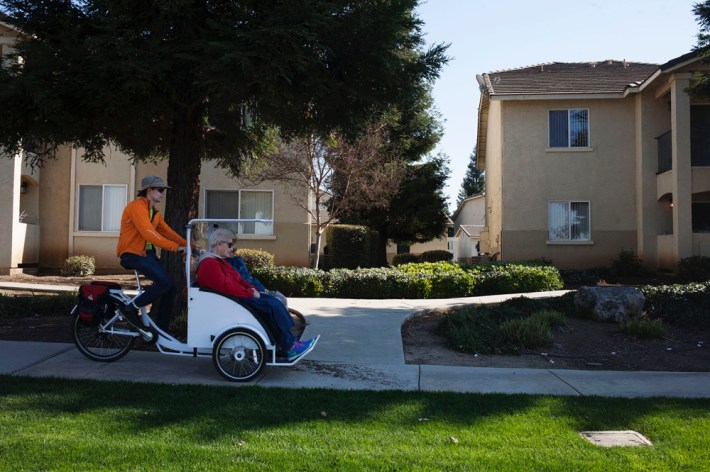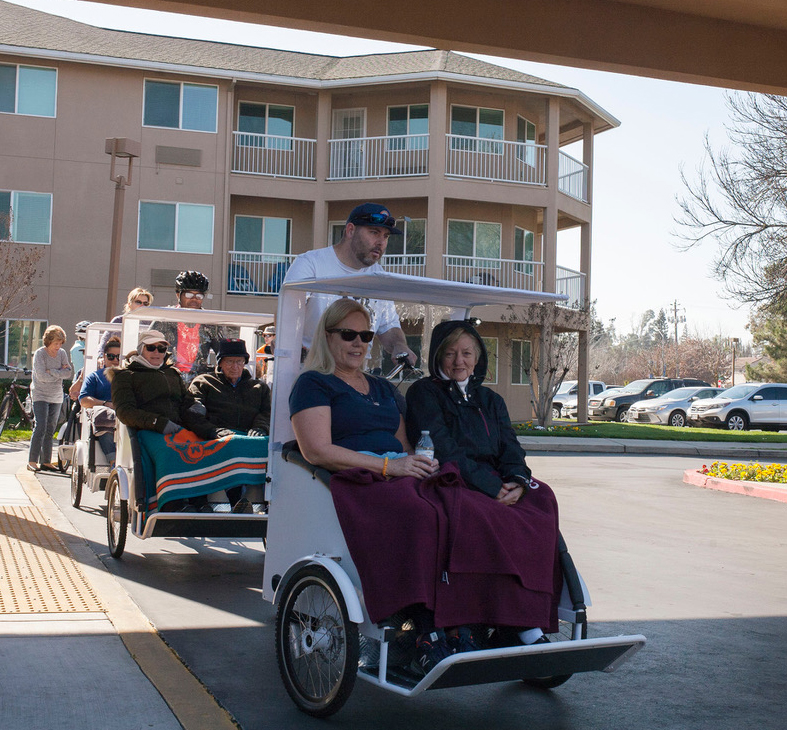Note: GJEL Accident Attorneys regularly sponsors coverage on Streetsblog San Francisco and Streetsblog California. Unless noted in the story, GJEL Accident Attorneys is not consulted for the content or editorial direction of the sponsored content.
The Merced Bicycle Coalition, in partnership with two senior residential facilities, has launched a fun program that gets seniors out and about via pedicabs. The idea stemmed from a desire to share the mental health and social benefits of cycling with people who are no longer able to ride themselves.
“It was great,” said Mildred Pitts, who took part in the first ride. She is in her eighties, and rode as a passenger. “The sun was shining. We talked the whole way.”
Pitts was among the fifteen residents of The Hampshire, an independent living facility in Merced, that took part in the inaugural ride on Saturday, February 17. The residents, some accompanied by family members or Hampshire staff, climbed aboard five pedicabs and caravanned down R Street and along Fahrens Creek trail, a paved off-street path that winds along the creek and past residential neighborhoods in North Merced.
Justin Hicks, a member of the Merced Bicycle Coalition and initiator of the pedicab project, said they mapped out a thirty-minute loop that would include as much time on quiet, low-stress bikeways as possible, following bike paths and a trail away from traffic. Drivers and passers-by noticeably slowed down and smiled or waved at the bright white pedicabs carrying elderly passengers—which is what Hicks said he hoped would happen.
“We want it to be an event, to bring people together. It’s quite a sight when you see all five bikes coming out at once,” he said.
Hicks said he and coalition members had been discussing ways to make their own cycling more social, because at the heart of it, bike riding remains a very individual activity. He first considered investing in a conference bike—a circular seven-person bicycle—and letting people ride it to downtown Merced. But the bikes cost almost $10,000 each, which gave him pause. Also, not many people seemed to be excited about the project.

But then he saw a video by Cycling Without Age, a Copenhagen-based organization that has spearheaded similar projects around the world, and he thought: “We could do that.”
Research consistently shows that physical activities like bicycling provide positive health impacts, including aiding in the prevention of heart disease, obesity, and depression. But walking and cycling can also bring other, less tangible psychological and social benefits to people when they interact with each other on the street, spend time outdoors, and have a way to get to know and feel at home in their community. This is what Cycling Without Age—and now the Merced Bicycle Coalition—focuses on.
Hicks said that when he solicited donations, feedback was overwhelmingly positive. He raised about $5,000 in nine days to purchase and ship five pedicabs and to retrofit them for safety and comfort. He contacted Cycling without Age to see about starting a Merced chapter of that organization, but found that the cost of their bicycles was too high.
“When [donors] understood what I was doing with seniors, they could empathize a bit more,” he said. “It had a huge appeal to community.”
The idea also appealed to Rene Cataño, activity coordinator for The Hampshire. After receiving assurances about safety, the retirement facility agreed to join the project because she saw the potential for the pedicab rides to enrich resident’s lives.
“Some of them don’t drive anymore,” she said. “On these bikes, they may not be going for miles and miles, but they are enjoying the city.”
Merced Bike Coalition members trained for three weeks to “drive” the pedicabs, learning how to maneuver the bike, how to accelerate, and how to handle an emergency stop. “It doesn’t operate like the bike you are used to,” said Hicks. “It pivots in the middle,” which takes some practice to get used to.

The plan is for the trained “drivers” to take residents from The Hampshire and another nearby assisted living facility out for a ride once a month.
“I’ve had family in [that] situation,” Hicks said. “They [had been] such an integral part of the community, and then something happened, and they couldn't live by themselves anymore.” Not being able to get around on their own can leave a person feeling helpless, or confined, or trapped, which is not good for anybody.
“I want to bring them back into the world,” said Hicks.






